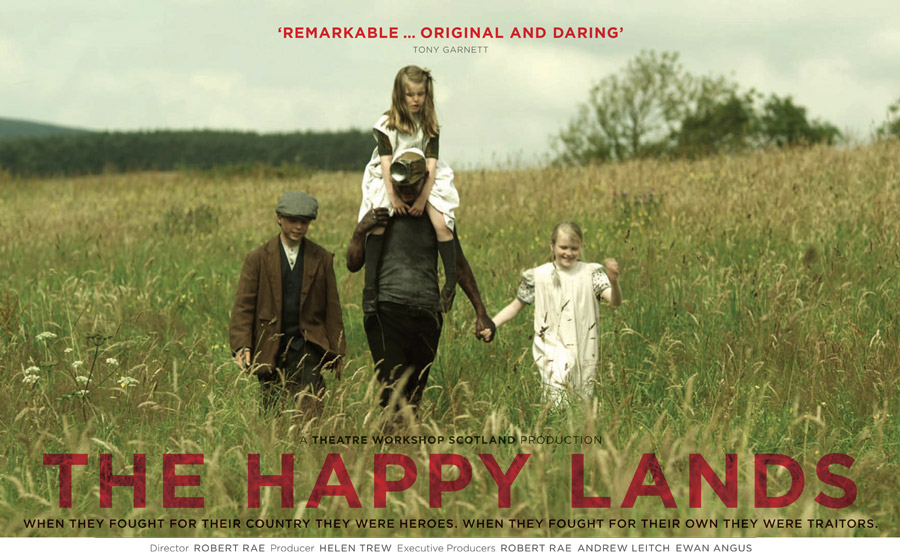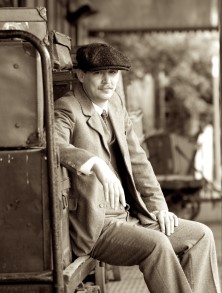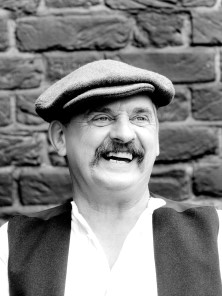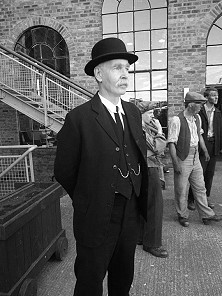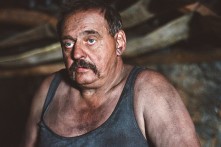 |
||||||||||||
This
is our archive website that is no longer being updated. For the new website please go to www.unison-scotland.org |
 Join UNISON Click here |
|||||||||||
|
||||||||||||
|
|
Three public service workers are on the verge of movie stardom with the launch of a ground-breaking film set in Fife during the 1926 General Strike. The community-led feature film by Theatre Workshop Scotland, directed by Robert Rae, links professional film makers with first-time locals who have owned the project. The community has not only taken on major acting roles but contributed to the research, writing, costumes, set building – including a whole street of miners’ cottages - and other ‘behind camera’ jobs. Due to be released this year, ‘The Happy Lands’ is set in the Fife coalfields and follows the journey of one mining community as they are forced into conflict with the coal company as they fight longer hours for less pay in a seven month lock out. The story of three families shows the human consequences of an impersonal economics in 1926 that resonates with what is happening now in 2012. For three of the first-time actors this has been a journey of emotion and self discovery. Craig Seath who plays Dr McCrae is a UNISON member working in environmental health in West Lothian. Jokie Wallace (Dan Guthrie) is a member at Carnegie College and Kevin Clarke (Michael Brogan) was a nurse till he gave up work to be a full time dad. Meeting the three in a pub in Cowdenbeath on a cold winter evening, the passion for the project shone through – along with the parallels with the present day. To them it was more than just a film. Much more. They recalled the energy, enthusiasm and then the apprehension as the project developed. The importance of what they were doing sank in when Tony Garnett, producer of Ken Loach’s award winning film Kes, told them their project was unique. “It’s a first in the world, so don’t bugger it up!” he warned. It didn’t do much for the apprehension but it did underline that something special was happening. “It is a one-off”, agreed Jokie Wallace: “I can’t see it happening again for many years”. The action unfolds only seven years after the slaughter of the trenches, as miners’ unions led the country against savage cuts by a Liberal/Tory government. “It is like what is happening now”, reflected Craig Seath who got involved after seeing a flyer for the project in High Valleyfield: “History is repeating itself as cuts follow the financial crisis”. So are there lessons for trade unions today? Craig thinks so: “It’s about people understanding what’s happening, what the effect is on them. Maybe it’s about trying to get more engaged with communities. There was more of a community spirit in 1926”. A view backed up by Kevin Clarke: “People spoke to each other more. The work was in the community, people travelled to and from work together and socialised together. It gave community support”. This was all the more important in a context where law-abiding citizens found themselves as law-breakers in a battle against the state. The actors’ own research of census records showed how big the build up of troops had been in the area at the time. It is perhaps no surprise, as Jokie pointed out, that future employers’ strategies were to separate the workplaces from communities. Craig had an interesting take on why people were more politically aware than they appear to be today. Not only were they forced into a political awakening by the human circumstances but, “The politicians lived in the community, they were literally people’s neighbours so there was more interaction”, he explained. The film developed from an idea by Robert Rae. In 2009 he started talking to people in the Fife communities, floating the idea for the film, holding public meetings, running a press campaign and directly involving local people. Over a hundred attended some Sunday sessions. As Helen Trew from Theatre Workshop Scotland explains: “The community are absolutely core – we could not make it without them. It’s their story, it’s their history.” For Jokie Wallace, the idea had a very personal relevance. His family worked in the pits and he recalls stories from his grandfather of the 1926 strike. The film has an authenticity woven from real life stories, people and events (not necessarily all in the strike) and Jokie’s family’s story is part of that. “I saw an advert in the paper and I’d always been interested in politics and trade unions but I’d never done anything like this before. The professionals were brand new and would take you through the process. There was a great spirit with the crew.” Kevin added: “There was great mutual support. Everyone helped each other”. And Craig was clear about the importance of what they were doing: “I wouldn’t have done it if I hadn’t felt we’d done justice to the history. People were in it for the right reasons. There was a great feeling of working for each other”. As well as the actors, the film has another UNISON connection. Ex national UNISON officer Bill Gilby helped with some of the research after his retirement from the union. He said: “The film tells the story I was trying to write about all those years ago as a student. For me it was unfinished business”. The film will have Cast and Crew Gala Screening in the Alhambra Dunfermline on 8 June followed by TV screenings in October. See more at http://www.thehappylands.com/ John Stevenson Scottish dates are now confirmed:It’s the General Strike 1926 - Only seven years after the slaughter of the trenches, millions of workers across the country down tools to take part in the biggest walk out in British history, taking a stand against savage austerity cuts imposed by a Liberal-Conservative government. Robert Rae’s epic, sweeping portrait of a definitive moment in the history of social justice charts the lives of three Scottish families as they deal with questions of loyalty, honour, love and trust in the midst of the Strike. Created with over 1000 members of the Fife community, this moving story of the hardship faced by the miners is ultimately a celebration of the indomitable human spirit, which will resonate around the globe. A game changing work that casts the people of the Fife Coalfield Communities at the heart of their own story and told it in their own voices and imprint it permanently on film. Theatre Workshop Scotland created an enduring social and artistic legacy that gave many participants what they have described as “the time of their lives”. Scottish dates are now confirmed: If you’ve got friends, family, workmates in these communities please spread the word and encourage them to attend. If you’ve got access to trade union or other email lists, please publicise the film via those routes. See the first public review in the Sunday Mail http://www.dailyrecord.co.uk/entertainment/movies/movie-news/relatives-pay-tribute-to-mining-heroes-1572327 and a hard hitting editorial at http://www.dailyrecord.co.uk/news/politics/mail-opinion-have-we-really-left-the-days-1572328 Updated 4 February 2013
|
|||||||||||||||||||||||||
